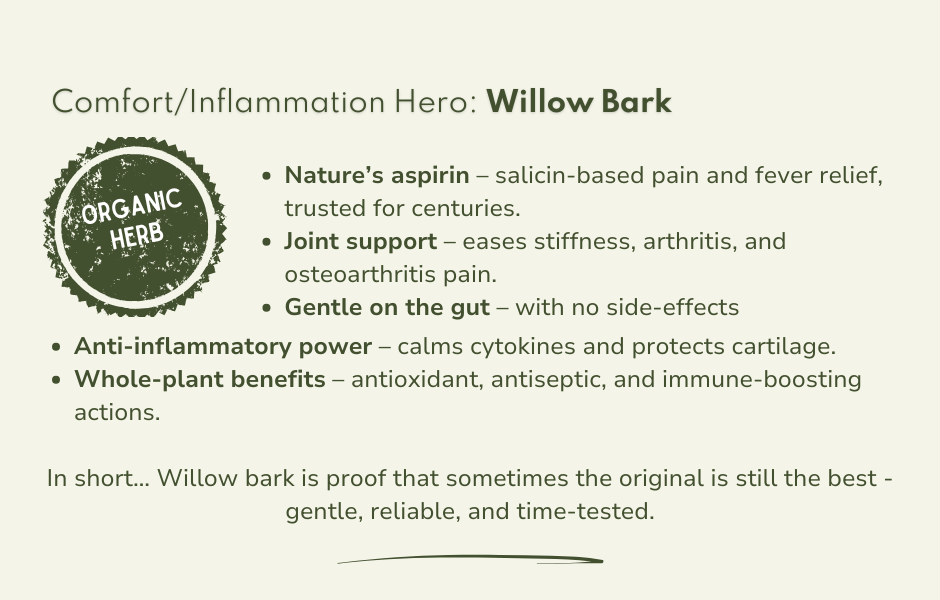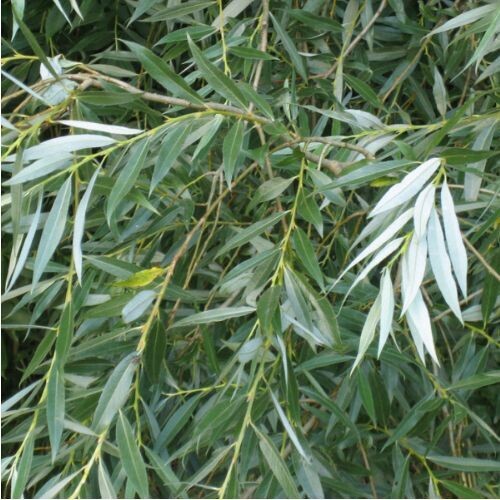WHITE WILLOW BARK (Salix alba) *Organic herb for horses - natural analgesia for comfort, soothing, easing
Benefits of Willow Bark for Horses
Willow bark is nature’s original aspirin - soothing pain, calming inflammation, and protecting joints with gentler, longer-lasting relief than its modern synthetic cousin.
Please note this is a nutritional, functional horse food supplement and not veterinary medicine. See Dr Kellon's Horse Sense - Nutrition is not 'Alternative' Therapy
.

Where to find Willow in the EquiNatural range
Here’s where you’ll also find Willow bark in our supplement support for horses:
- DuoBute - organic support to manage ongoing chronic discomfort and inflammation
- TriBute - fast-acting support for acute discomfort / inflammation
- WildFed - nourishes the hindgut biome with rich prebiotic plant diversity
Composition & Feed Guide
💧Organic Willow Bark Tincture
Our human-grade, certified organic tinctures give you a ready-to-absorb potent source of phytonutrients at the highest-strength available, for immediate absorption straight into the bloodstream and to the body’s cells.
- Salix alba
- Bark
- Decocted 1:3 35%
- Organic grown
~ Feed Guide - willow tincture for horses
- 6ml/100kg bodyweight, daily in feed.
- Our tinctures come in a heat-sealed, twin-neck, child-resistant HDPE plastic dosing bottle, complete with dosing chamber. *HDPE (High-Density Polyethylene) plastic is 100% recyclable, and energy-efficient to produce. Safe for food/water storage, it reduces waste and emissions while resisting wear. A top sustainable choice to match the EquiNatural ethos.
🌿Organic Dried Willow Bark for Horses
Grown, harvested and dried without the use of agri-chemicals, non-irradiated and GMO free - see our Quality page for Quality Management & Certification Documents.
- Salix alba* (See Clinical Considerations below)
- Bark, cut
- Organic w ild harvested
- Origin Poland
~ Feed Guide - dried willow bark for horses
- 5g/100kg bodyweight per day, thus for an average 500kg horse add 25g daily to feed.
- Want a scoop? You can add a scoop to your basket during checkout.
- ♻️Supplied in a 100% fully recylable, resealable, food-grade foil pouch for freshness.
Functional Nutritional Value
Constituents: Phenolic glycosides (salicin), tannins, flavonoids, and catechin.
Footnotes
- Laboratory tested for identification and compliance to the British and European Pharmacopoeia standards.
- Human grade.
- Please be aware that if you're purchasing our dried botanicals for human use, our dried range is cut to appropriate sizes for feeding to horses.
- ♻️ Eco Note: Our packaging is recyclable and refillable.
- 🧊 Storage Tip: Keep cool and dry.
Clinical Considerations
- Pregnant or nursing mares - always seek veterinary advice before feeding.
- Do not feed if taking anticoagulants.
* Willow contains Salicylic acid which is a controlled substance; always check competition rules.
Willow in History & Tradition
Before the pharmacy shelves were stacked with aspirin, there was willow bark. This humble tree’s bark has been used for thousands of years to calm pain, ease inflammation, and bring fevers down - earning it a reputation as one of nature’s most reliable remedies.
Ancient wisdom, modern science
Chinese physicians were using willow as early as 500 BC for pain relief, and Dioscorides himself recommended willow leaves mashed with pepper and wine for back pain. The Greeks infused willow in olive oil to soothe arthritis, while Native Americans chewed the leaves or brewed teas to ease headaches, toothaches, and fevers.
Fast forward to the 18th century, when Edward Stone carefully documented its fever-fighting powers - laying the groundwork for the discovery of salicin, the natural compound at the root of willow’s benefits. By the late 1800s, chemists had created a synthetic version: salicylic acid, better known today as aspirin.
Willow vs. Aspirin – what’s the difference?
While aspirin stole the limelight, willow bark never truly left. Unlike aspirin, willow’s salicin is converted slowly by the body, giving it a longer-lasting effect without the common digestive side effects. It may not act as quickly as a pill, but it’s gentler and still impressively effective.
In fact, modern research shows willow can ease osteoarthritis pain, lower back pain, and even protect cartilage from damage - all while being kinder to the gut.
Beyond pain relief
Willow bark doesn’t stop at pain and fevers. It also brings antioxidant, antiseptic, and immune-boosting benefits thanks to its flavonoids and polyphenols. It’s not just a painkiller - it’s a tonic that supports long-term resilience.
That’s why you’ll find willow bark woven into our DuoBute & TriBute blends for pain and inflammation, and even in WildFed, where its fibrous bark adds prebiotic roughage for gut health.
© EquiNatural 2026. All content, formulations, and materials are original works protected under copyright, and are for personal study only. Content cannot be re-published or duplicated for commercial use.


